
Improvisational theatre, often called improvisation or improv, is the form of theatre, often comedy, in which most or all of what is performed is unplanned or unscripted, created spontaneously by the performers. In its purest form, the dialogue, action, story, and characters are created collaboratively by the players as the improvisation unfolds in present time, without use of an already prepared, written script.

The performing arts are arts such as music, dance, and drama which are performed for an audience. They are different from the visual arts, which involve the use of paint, canvas or various materials to create physical or static art objects. Performing arts include a range of disciplines which are performed in front of a live audience, including theatre, music, and dance.

Punch and Judy is a traditional puppet show featuring Mr. Punch and his wife Judy. The performance consists of a sequence of short scenes, each depicting an interaction between two characters, most typically Mr. Punch and one other character who usually falls victim to Punch's slapstick. The Daily Telegraph called Punch and Judy "a staple of the British seaside scene". The various episodes of Punch comedy—often provoking shocked laughter—are dominated by the clowning of Mr. Punch.

A playwright or dramatist is a person who writes plays.
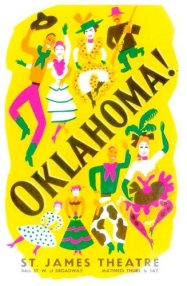
Oklahoma! is the first musical written by the duo of Rodgers and Hammerstein. The musical is based on Lynn Riggs's 1931 play, Green Grow the Lilacs. Set in farm country outside the town of Claremore, Indian Territory, in 1906, it tells the story of farm girl Laurey Williams and her courtship by two rival suitors, cowboy Curly McLain and the sinister and frightening farmhand Jud Fry. A secondary romance concerns cowboy Will Parker and his flirtatious fiancée, Ado Annie.

Mario Fortino Alfonso Moreno Reyes, known by the stage name Cantinflas, was a Mexican comedian, actor, and filmmaker. He is considered to have been the most widely accomplished Mexican comedian and is celebrated throughout Latin America and in Spain as a popular icon. His humor, loaded with Mexican linguistic features of intonation, vocabulary, and syntax, is beloved in all the Spanish-speaking countries of Latin America and in Spain and has given rise to a range of expressions including cantinflear, cantinflada, cantinflesco, and cantinflero.

Genesis is the name of two separate fictional characters appearing in American comic books published by Marvel Comics. The first and most well known is Tyler Dayspring, a mutant and foe of Cable and Wolverine. He first appeared in a flashback in X-Force #1, and appeared as Mister Tolliver is in X-Force #5 (1992) and his first appearance as Genesis was in Cable #19. Some sources state that he is Cable's son, while others state that he is actually Cable's 'nephew' since his father was Stryfe.
The Theatre of Cruelty is a form of theatre conceptualised by Antonin Artaud. Artaud, who was briefly a member of the surrealist movement, outlined his theories in a series of essays and letters, which were collected as The Theatre and Its Double. The Theatre of Cruelty can be seen as a break from traditional Western theatre and a means by which artists assault the senses of the audience. Artaud's works have been highly influential on artists including Jean Genet, Jerzy Grotowski, Peter Brook, and Romeo Castellucci.

Theater in the United States is part of the old European theatrical tradition and has been heavily influenced by the British theater. The central hub of the American theater scene is Manhattan, with its divisions of Broadway, Off-Broadway, and Off-Off-Broadway. Many movie and television stars have gotten their big break working in New York productions. Outside New York, many cities have professional regional or resident theater companies that produce their own seasons, with some works being produced regionally with hopes of eventually moving to New York. U.S. theater also has an active community theater culture, which relies mainly on local volunteers who may not be actively pursuing a theatrical career.
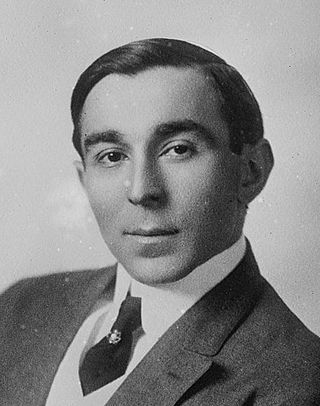
Lee Shubert was a Lithuanian-born American theatre owner/operator and producer and the eldest of seven siblings of the theatrical Shubert family.

Susan Essman is an American stand-up comedian, actress, writer and television producer, best known for her role as Susie Greene on Curb Your Enthusiasm, Bobbi Wexler on Broad City, and the voice of Mittens in Bolt.
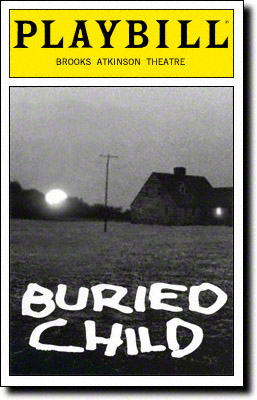
Buried Child is a play written by Sam Shepard that was first presented in 1978. It won the 1979 Pulitzer Prize for Drama and launched Shepard to national fame as a playwright. The play depicts the fragmentation of the American nuclear family in a context of disappointment and disillusionment with American mythology and the American Dream, the 1970s rural economic slowdown, and the breakdown of traditional family structures and values. In 1979, Shepard also won the Obie Award for Playwriting. The Broadway revival in 1996 received five Tony nominations, including Best Play.
Theatre in Pakistan has been developed and influenced by the traditional and ritual Persian theatre as well as the classical Indian dance practices of the Mughal Empire. As an Islamic state, the production of plays and theatrical performances in the past was not condoned in the country for religious reasons that is why this performing art did not have the opportunity to develop and flourish. The concept of Pakistani theater as a national heritage could only be traced back to modern plays due to the absence of any classical theatrical tradition while folk literature has also been largely obscured except the performances of the Bhand.
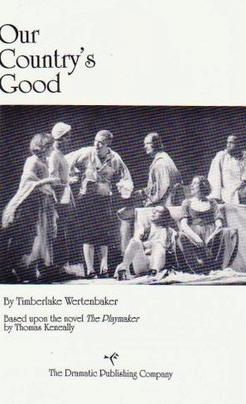
Our Country's Good is a 1988 play written by British playwright Timberlake Wertenbaker, adapted from the Thomas Keneally novel The Playmaker. The story concerns a group of Royal Marines and convicts in a penal colony in New South Wales, in the 1780s, who put on a production of The Recruiting Officer.
The Schaffner Players was a traveling theatre group that performed in the Midwest Opera Houses, in traveling tent shows, and later on the radio for 72 years.

George Walker was an American vaudevillian, actor, and producer. In 1893, in San Francisco, Walker at the age of 20 met Bert Williams, who was a year younger. The two young men became performing partners. Walker and Williams appeared in The Gold Bug (1895), Clorindy (1898), The Policy Player (1899), Sons of Ham (1900), In Dahomey (1903), Abyssinia (1906), and Bandanna Land (1907). Walker married dancer Ada Overton, who later also was a choreographer.
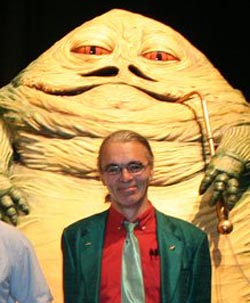
Toby Philpott is an English puppeteer best known for his work in motion picture animatronics during the 1980s in such films as The Dark Crystal and Return of the Jedi. Born into a family of entertainers, Philpott dropped out of school and traveled the world during the 1960s, squatting in various locations and surviving off money he earned from his work as a street performer, which included juggling, fire eating, magic shows, clowning and acrobatics. He began his film career after Jim Henson personally selected Philpott to work on the 1982 fantasy film The Dark Crystal, in which he worked side-by-side with Henson.
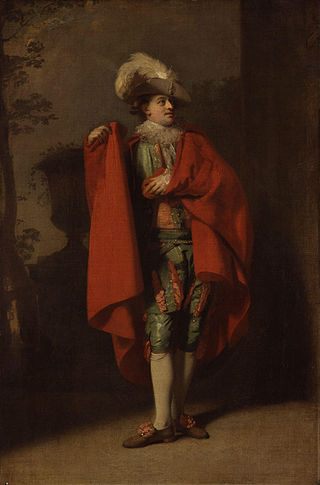
John Palmer was an actor on the English stage in the eighteenth century. There was also another John Palmer (1728–1768) who was known as Gentleman Palmer. Richard Brinsley Sheridan nicknamed him Plausible Jack.
Tent shows have been an important part of American history since the mid-to-late nineteenth century. In 1927, Don Carle Gillette gave "statistical evidence that the tented drama constituted 'a more extensive business than Broadway and all the rest of the legitimate theatre industry put together.'" The shows first began "in regions which couldn’t support full-time playhouses." Men such as Fayette Lodowick, one of the earliest tent show entrepreneurs, would travel around river towns all over the United States making money on traveling tent shows. These shows "were utilized for a variety of amusements including medicine shows, moving picture shows, vaudeville shows, circuses, musicals, concert companies, and any number of one-night stand dramatic troupes."
Eddie Lightfoot was an American minstrel dancer active for more than 40 years in the itinerant black stage and tent theatre circuits of the first half of the Twentieth Century. Missing the lower half of his right leg, he performed under the stage names "Peg" or "Peg Leg" Lightfoot in myriad minstrel companies including Alexander Tolliver's "Big Show" and "Smart Set", and The Rabbit's Foot Minstrels from as early as 1913 into the mid-1950s.














